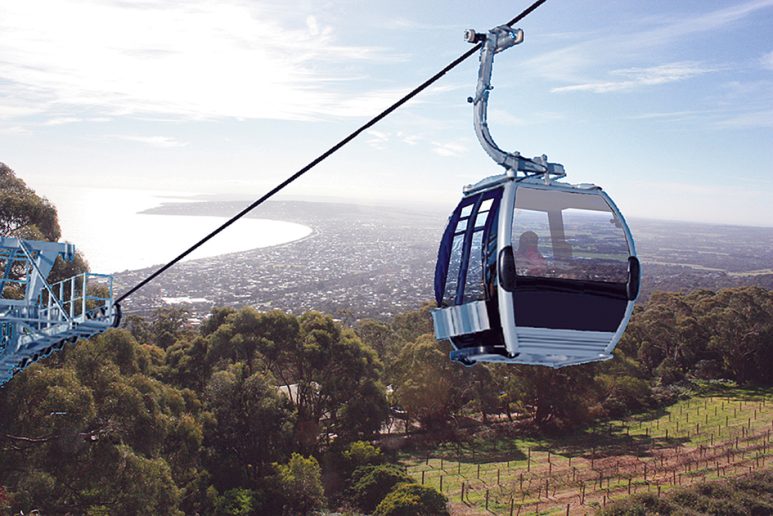BLASTING may be required on Arthurs Seat to build foundations for the towers and cables that will carry Skylift’s gondolas.
Helicopters will lift the towers into position, according to a Mornington Peninsula Shire report.
“Parts of Arthurs Seat Rd will need to be closed temporarily (five minutes at a time) during these works,” says a report in the 10 August council agenda.
“It is proposed to use helicopters to install [three towers]. This is required due to the steep terrain surrounding these locations, which is not accessible with convention [sic] vehicles and equipment,” the officers’ report states.
“The helicopters will arrive from offsite and will carry the constructed pylons from the summit carpark staging area to their final locations within the corridor. The helicopter will not land on site.”
One tower is to be erected near dwellings, “thus limiting the amenity impacts associated with the use of helicopters”. Residents will be notified in advance of the work.
“Any areas required to be blasted [because of harder rock] will be covered to prevent flying debris. Prior to any blasting, residents which [sic] may be affected will receive seven days’ notice,” the report states.
“This will enable residents the opportunity to plan for the event. In addition, council, Parks Victoria and VicRoads will also be notified.
“Any blasting will be undertaken in accordance with a blast management plan using a technique with low vibration, with video and vibration monitoring also occurring. No explosives will be stored onsite, other than those used for blasting on the day.”
The officers’ report recommends approval for remaining details of the Skylift project, including the construction phase and how the area will be protected during construction.
The report reveals that Doppelmayr and Rydell Constructions will build the $18 million project.
“Doppelmayr are responsible for the works within the gondola corridor and the gondola cabins, with Rydell Constructions responsible for the construction of the upper and lower stations.”
Building is proposed to start this month and is expected to take about 14 months in total. “[C]onstruction of in-ground components, foundations and trenching will take approximately five months and assembly and commissioning [will take] a further six months”.
Skylift was mentioned at the Seawinds ward meeting on Thursday 6 August. More trees are proposed to be removed, lopped or pruned along the 40-metre-wide corridor over which the gondolas will travel up and down Arthurs Seat.
Twenty-six trees were originally approved by the Victorian Civil and Administrative Tribunal for removal. That number has now been revised to 39 of the 92 trees that have been “visually inspected, photographed, and their locations plotted via GPS”.
Ten trees are proposed to be retained “and the remainder [are] identified as requiring further assessment post construction of the [towers] and cables to determine whether full removal or pruning/lopping is required”. This means a further 80 or so trees along the corridor may be removed, lopped or pruned, compared with the original 26.
Also raised at Thursday’s ward meeting was the low fire rating of the summit station.
The shire’s statutory planning manager Niall Sheehy said council’s in-house experts has liaised with the CFA and the other emergency services and were comfortable with the rating.
The station will be built to cope with Bushfire Attack Level 12.5, the second lowest rating. A local house built recently was required to meet the BAL 40 standard, at substantial extra cost.
- Former Telstra chief David Thodey has replaced Skylift boss Simon McKeon as CSIRO chair. Mr McKeon’s term expired in June.
CSIRO Staff Association secretary Sam Popovski welcomed the appointment, saying the flagship scientific group “continues to suffer the effects of heavy cuts to funding, jobs and research”.
“Staff morale at CSIRO remains low, with the workforce reeling from the loss of one in five jobs over the past two years,” Mr Popovski said.
Mr Thodey would also face challenges in protecting staff against the federal government’s push to cut CSIRO working conditions, and championing the cause of scientific integrity within political and policymaking circles, Mr Popovski said.
First published in the Southern Peninsula News – 11 August 2015


